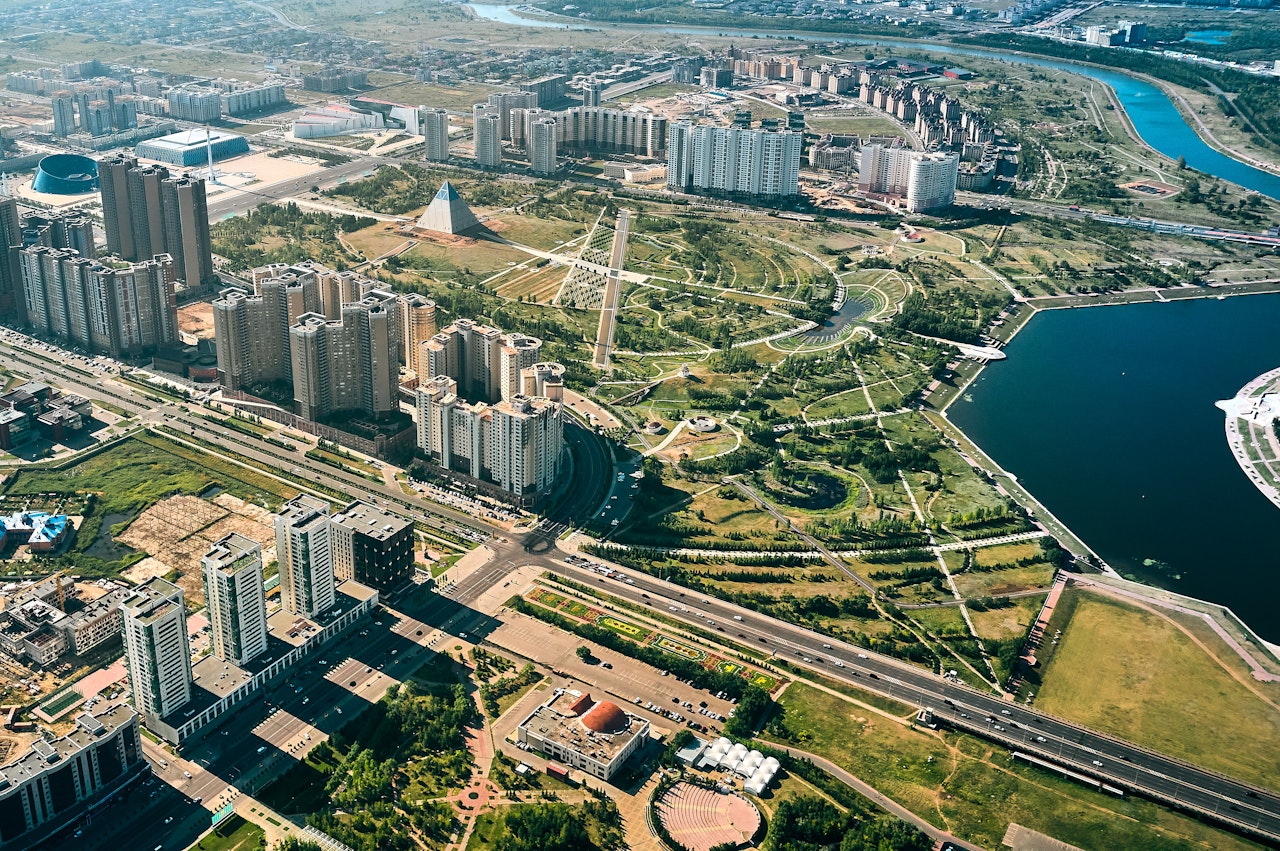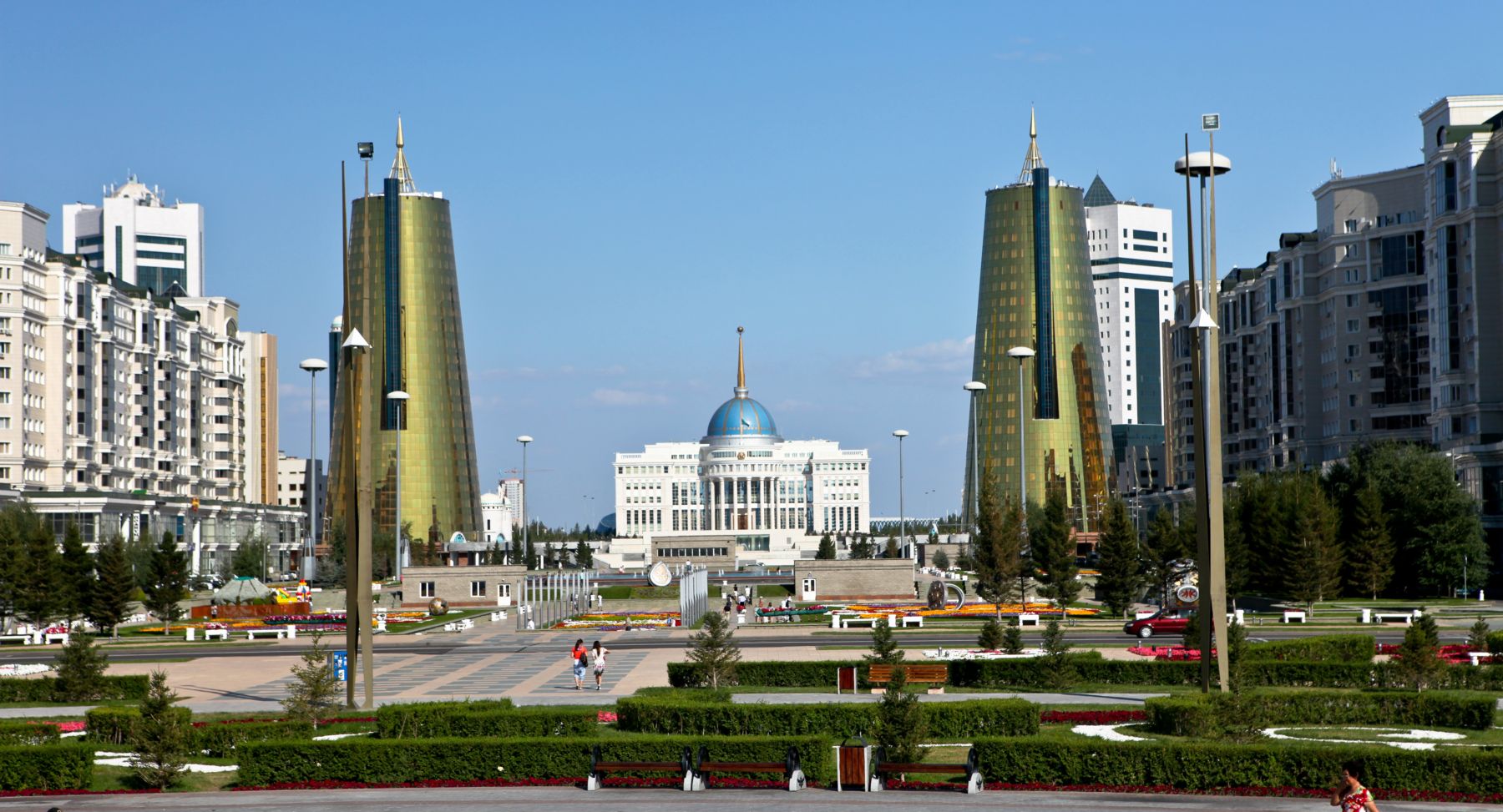Kazakhstan: A Crossroads of Continents and Commerce
A suitable business location, Kazakhstan, is the largest landlocked nation globally, and serves as a vital bridge between Europe and Asia, blending traditional heritage with modern economic development. Known for its expansive steppes, towering mountains, and vibrant cities, Kazakhstan is a land of immense natural wealth and cultural diversity. Positioned along the historic Silk Road, the country has become an essential player in international trade, leveraging its abundant reserves of oil, gas, and minerals to fuel its economic growth.
Living Standards in Kazakhstan
Kazakhstan offers a comparatively high standard of living, particularly in its urban centers, and continues to progress through infrastructure development and social investment.
- Income Levels: With one of the highest GDPs per capita in Central Asia, Kazakhstan demonstrates growing economic strength. However, income inequality persists, with urban hubs like Astana and Almaty offering higher wages and better amenities than rural areas.
- Healthcare: The healthcare system combines public and private services. Public healthcare is free for citizens but often lacks quality, while private clinics provide superior care for those who can afford it.
- Education: Education is compulsory and free for children aged 6 to 17. Affordable higher education is available, with significant emphasis on technical and vocational training to meet the demands of the evolving job market.
- Infrastructure: Modern transport systems, well-maintained roads, and efficient public services in urban areas contribute to a comfortable and convenient lifestyle for residents.
Kazakhstan’s Personal Tax System
Kazakhstan’s straightforward and low personal tax system encourages compliance and economic participation.
- Flat Income Tax Rate: All individuals are taxed at a uniform rate of 10%, making Kazakhstan one of the region’s most tax-friendly nations.
- Social Security Contributions: Employees contribute 10% of their income to the Unified Accumulative Pension Fund, while employers pay 3.5% for social security benefits, including health insurance.
- Tax Deductions: Individuals can claim deductions for education, medical expenses, and specific investments, enhancing the system’s appeal for taxpayers.
Corporate Taxation in Kazakhstan
Kazakhstan’s corporate tax structure is designed to attract local and foreign investors while fostering economic growth.
- Corporate Income Tax (CIT): Businesses are taxed at a standard rate of 20% on their taxable profits, ensuring competitiveness in the region.
- Value-Added Tax (VAT): A VAT of 12% applies to most goods and services, with exemptions for essential items like food and medicine.
- Investment Incentives: Companies operating in Special Economic Zones (SEZs) benefit from reduced tax rates and customs exemptions. Additional tax breaks are available for enterprises in agriculture, manufacturing, and renewable energy sectors.
Key Industries Driving Kazakhstan’s Economy
Kazakhstan’s economic strength lies in its resource wealth and diversification efforts across multiple sectors:
- Oil and Gas: As one of the world’s top oil producers, Kazakhstan’s Tengiz and Kashagan oil fields contribute significantly to GDP and exports, attracting global energy companies.
- Mining and Minerals: The country leads global uranium production and is rich in coal, copper, and gold reserves, making mining a cornerstone of its economy.
- Agriculture: With fertile land and favorable conditions, agriculture thrives, producing wheat, barley, and cotton. Livestock farming supports meat and dairy production.
- Manufacturing: The industrial sector is growing, and producing machinery, chemicals, and construction materials. Government initiatives promote industrial diversification.
- Renewable Energy: Investments in wind, solar, and hydroelectric projects align with Kazakhstan’s commitment to sustainability.
- Tourism: Stunning natural landscapes, cultural landmarks, and unique attractions like the Altai Mountains and Caspian Sea position Kazakhstan as an emerging destination for global travelers.
Inflation and Cost of Living in Kazakhstan
While Kazakhstan remains affordable compared to Western nations, costs vary between urban and rural areas.
- Inflation: Influenced by global oil prices and currency fluctuations, inflation rates typically range between 6% and 9%, impacting the cost of imported goods and services.
- Housing: Rental prices in Astana and Almaty range from $300 to $700 per month for a one-bedroom apartment. Rural housing is significantly cheaper.
- Food and Dining: Local groceries are budget-friendly, but imported items carry higher price tags. Dining out costs $10–$20 per person at mid-range restaurants.
- Transportation: Public transport is efficient and affordable, with monthly passes costing $10–$15.
- Utilities: Monthly expenses for utilities like electricity, heating, and water average $50–$100, depending on location and usage.
Property, Sales, and Service Taxes in Kazakhstan
Kazakhstan’s tax framework is structured to support economic development while ensuring revenue generation:
- Property Tax:
- Residential properties are taxed annually at rates between 0.1% and 0.5% of their assessed value.
- Commercial properties incur higher rates, around 1.5%.
- Value-Added Tax (VAT):
- A standard VAT of 12% applies to most goods and services, with exemptions for necessities like food and medicine.
- Excise Taxes:
- Levied on specific goods such as alcohol, tobacco, and fuel, excise taxes regulate consumption and contribute to state revenue.
- Social Contributions:
- Employers make additional payments to social insurance funds, covering pensions, healthcare, and unemployment benefits.
Business Structures in Kazakhstan: Options for Entrepreneurs
Entrepreneurs in Kazakhstan have several choices when it comes to selecting a business structure. The most common types of entities include:
- Limited Liability Partnership (LLP):
- Ideal for small and medium-sized enterprises.
- Requires at least one founder and a nominal charter capital of 100 KZT.
- Limits liability to the amount of capital invested, offering protection to owners.
- Joint-Stock Company (JSC):
- Designed for larger businesses with multiple shareholders.
- Requires a minimum charter capital of 50 million KZT, making it suitable for substantial enterprises.
- Branch Office:
- Allows foreign businesses to operate in Kazakhstan without forming a separate legal entity.
- Often used for testing markets or maintaining a presence for representation purposes.
- Sole Proprietorship:
- Best suited for individual entrepreneurs.
- Simple to set up but carries unlimited personal liability.
- Representative Office:
- Similar to a branch office but limited to non-commercial activities, such as marketing or research.
Licensing Requirements for Businesses in Kazakhstan
Starting a business in Kazakhstan requires compliance with licensing and registration procedures to meet regulatory standards. The key steps are as follows:
- Business Registration:
- Register your company with the Ministry of Justice to secure a Taxpayer Identification Number (TIN).
- The process is efficient, and typically completed within five business days.
- Industry-Specific Licenses:
- Certain sectors, such as healthcare, education, and construction, require specialized licenses issued by relevant authorities.
- Social Security Registration:
- All businesses employing staff must register their employees with the Unified Accumulative Pension Fund by labor laws.
- Environmental Permits:
- Businesses in manufacturing or energy production may need environmental assessments and permits to operate.
Kazakhstan continues to improve its business environment, offering streamlined registration and online platforms to simplify these processes.

Business Opportunities for Expats in Kazakhstan
Kazakhstan’s growing economy and strategic location offer immense opportunities for expatriates to establish or expand their businesses:
- Energy and Infrastructure:
- With its vast reserves of oil, gas, and renewable energy potential, Kazakhstan provides lucrative opportunities for ex-pats skilled in energy and infrastructure development.
- Technology and IT:
- The government’s emphasis on building a tech ecosystem opens doors for startups and IT service providers, including software development and digital solutions.
- Agriculture and Food Processing:
- Expats can leverage Kazakhstan’s vast agricultural resources to modernize farming practices, introduce organic food production, and boost food exports.
- Tourism and Hospitality:
- Investments in eco-tourism, hotel development, and cultural tourism align with the country’s goal of becoming a global tourist destination.
- Education and Training:
- Opportunities abound in professional development, vocational training, and English-language instruction, meeting the demand for skilled labor in an evolving economy.
Pathways to Citizenship for Expats in Kazakhstan
Kazakhstan offers pathways to citizenship for expatriates, although the process requires careful adherence to legal requirements:
- Residency Requirements:
- Expats must reside in Kazakhstan for a minimum of five consecutive years to apply for citizenship.
- This period is reduced to three years for those married to Kazakhstani citizens.
- Language Proficiency:
- Applicants must demonstrate basic proficiency in the Kazakh language and pass a citizenship test.
- Economic Contributions:
- Significant investment in Kazakhstan’s economy or contributions to key industries can expedite the citizenship process.
- Dual Citizenship:
- Kazakhstan does not allow dual citizenship, requiring applicants to renounce their original nationality.
Advantages of Registering a Business in Kazakhstan
Registering a company in Kazakhstan offers numerous benefits for entrepreneurs and investors:
- Strategic Location:
- Situated along the modern Silk Road, Kazakhstan connects Europe and Asia, making it a prime location for trade and logistics.
- Abundant Resources:
- With vast reserves of oil, natural gas, coal, and minerals, the country offers unmatched opportunities for companies in energy, mining, and related industries.
- Economic Stability:
- Robust infrastructure investments and diversified growth strategies ensure Kazakhstan’s economic stability and growth potential.
- Government Incentives:
- Tax breaks, simplified registration processes, and exemptions for businesses in Special Economic Zones (SEZs) encourage foreign investment.
- Regional Market Access:
- As a member of the Eurasian Economic Union (EAEU), Kazakhstan provides access to a market of over 180 million people across member states.
Step-by-Step Guide to Registering a Company in Kazakhstan
Setting up a business in Kazakhstan is straightforward, thanks to streamlined regulations and supportive government policies. Here’s how:
- Choose a Business Structure:
- Decide on the type of entity best suited for your business, such as:
- LLP: Ideal for small and medium businesses.
- JSC: Suitable for larger enterprises.
- Branch or Representative Office: For foreign businesses testing the market or conducting non-commercial activities.
- Decide on the type of entity best suited for your business, such as:
- Prepare Required Documents:
- Gather necessary documents, including articles of incorporation, identification for founders, and proof of business address.
- Business Name Reservation:
- Reserve a unique business name with the Ministry of Justice to ensure compliance with naming regulations.
- Submit Registration Application:
- File the registration with the Ministry of Justice to receive a Taxpayer Identification Number (TIN) and official recognition of your business.
- Open a Corporate Bank Account:
- Set up a business account in a local bank to deposit the required share capital and facilitate transactions.
- Obtain Sector-Specific Licenses:
- Depending on your industry, secure the necessary licenses and permits for your operations.
- Register Employees:
- If hiring staff, register them with the Unified Accumulative Pension Fund and comply with social insurance requirements.
Cost of Business Registration in Kazakhstan
Setting up a business in Kazakhstan is cost-effective, offering entrepreneurs an affordable entry into a growing economy. Key expenses include:
- Registration Fees:
- Limited Liability Partnership (LLP) registration costs between $50–USD 100.
- Joint-Stock Company (JSC) registration ranges from $200–$USD 500
- Legal and Notary Services:
- Professional fees for preparing and notarizing documents vary between $300–$1,000 USD, depending on the complexity of the paperwork.
- Minimum Share Capital:
- LLPs require a nominal capital of just 100 KZT, which is negligible in practical terms.
- JSCs need a minimum capital of 50 million KZT, making them suitable for larger enterprises.
- Industry-Specific Licenses:
- Fees for permits in regulated sectors like healthcare or construction range from $100 to USD 2,000.
- Banking Fees:
- Establishing a corporate account incurs minimal costs, typically under $USD 50
Overall, the total cost to start a business in Kazakhstan falls between $500 and USD 3 3,000depending on the business type and additional licensing needs.
Kazakhstan’s International Relations and Economic Partnerships
Kazakhstan’s diplomatic ties and strategic alliances play a pivotal role in its economic progress and integration into global markets:
- Regional Cooperation:
- As a member of the Eurasian Economic Union (EAEU), Kazakhstan collaborates with Russia, Belarus, Armenia, and Kyrgyzstan to promote free trade, economic integration, and labor mobility.
- Belt and Road Initiative:
- Positioned at the heart of China’s Belt and Road Initiative, Kazakhstan benefits from infrastructure projects enhancing trade routes between Asia and Europe.
- Partnerships with Russia:
- Kazakhstan shares deep economic and cultural ties with Russia, collaborating on energy, transportation, and defense projects.
- Relations with Western Nations:
- Trade agreements with the European Union focus on energy exports and industrial goods, while ties with the United States foster cooperation in education, technology, and security.
- Ties with the Middle East and Asia:
- Kazakhstan leverages its Muslim-majority population and geographic position to build cultural and economic relationships with Middle Eastern and Asian countries.
Additional Tax Obligations for Businesses in Kazakhstan
Apart from corporate income tax, businesses in Kazakhstan must comply with other tax requirements:
- Property Tax:
- Owners of real estate pay an annual property tax based on the assessed value, with rates typically ranging from 0.1% to 1.5%.
- Value-Added Tax (VAT):
- The standard VAT rate is 12%, applied to most goods and services. Essentials like food and healthcare may be exempt or subject to reduced rates.
- Excise Taxes:
- Levied on goods like alcohol, tobacco, and fuel, these taxes aim to regulate consumption and generate revenue.
- Social Security Contributions:
- Employers contribute 3.5% of an employee’s gross salary to social insurance, while employees pay 10% to pension funds.
- Environmental Taxes:
- Businesses in sectors like mining and energy are subject to environmental levies to mitigate their ecological impact.
Kazakhstan’s Comprehensive Social Security System
Kazakhstan’s social security framework ensures financial stability and access to essential services for its citizens. Key components include:
- Pension Scheme:
- Employees contribute 10% of their income to the Unified Accumulative Pension Fund, securing financial support in retirement. The government also provides basic pensions for individuals with insufficient contributions.
- Healthcare:
- Funded through employer contributions, Kazakhstan’s mandatory health insurance system offers public healthcare services. While accessible, many residents opt for private clinics for better quality care.
- Unemployment Benefits:
- Workers who lose their jobs can claim unemployment benefits, provided they have contributed to the social insurance system.
- Family and Maternity Support:
- Allowances for children, maternity leave, and parental benefits ensure household stability and encourage population growth.
Climate and Safety in Kazakhstan
Kazakhstan’s vast geography results in diverse climates and a reputation for safety, making it an attractive destination for residents and visitors alike.
Climate Overview:
- Summer: Hot and dry, with temperatures often reaching 30°C to 40°C in southern regions.
- Winter: Cold and snowy, especially in northern areas, with temperatures dropping below -20°C.
- Spring and Autumn: Brief but pleasant, with moderate weather ideal for travel and outdoor activities.
Regional Safety:
- Low Crime Rates:
- Violent crime is rare, and incidents of petty theft or scams are uncommon, particularly in urban centers like Almaty and Astana.
- Political Stability:
- Kazakhstan’s government maintains strong law enforcement and proactive measures to ensure national security.
- Community Harmony:
- Known for its hospitality, Kazakhstan fosters a sense of inclusivity and safety for locals and expats alike.
Global Mobility with a Kazakh Passport
The Kazakh passport provides moderate travel flexibility, with access to numerous countries:
- Visa-Free or Visa-on-Arrival Travel:
- Holders can visit over 70 countries without requiring a visa, including Russia, Turkey, and several Asian nations.
- Restricted Access:
- Western destinations like the European Union, the United States, and Canada require visas, though ongoing negotiations may expand travel privileges in the future.
Kazakhstan’s growing geopolitical influence and international partnerships promise further enhancements to its passport strength.
Education, Economic Growth, and Lifestyle Opportunities
Kazakhstan prioritizes education and offers ample opportunities for personal and professional development:
Education System:
- Primary and Secondary Education:
- Free and compulsory for children aged 6 to 17, focusing on mathematics, sciences, and language studies.
- Higher Education:
- Universities such as Nazarbayev University and Al-Farabi Kazakh National University are recognized for their excellence.
- Technical and vocational training supports the growing demand for skilled labor.
- International Scholarships:
- Programs like the Bolashak Scholarship enable Kazakh students to pursue higher education abroad.
Growth Opportunities:
- Thriving Industries:
- Oil, gas, mining, agriculture, and IT sectors offer lucrative career and investment opportunities.
- Entrepreneurship:
- Government initiatives, including tax incentives and grants, support startups and small businesses, particularly in special economic zones.
Lifestyle Benefits:
Affordable living costs, a rich cultural heritage, and abundant recreational activities, including hiking and skiing, contribute to a high quality of life. Kazakhstan’s dynamic blend of tradition and modernity ensures a fulfilling experience for residents and visitors alike.






